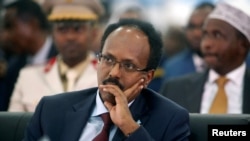Somali President Mohamed Abdullahi Mohamed said he was willing to negotiate with stakeholders in Somalia's political crisis in order to find a solution.
Mohamed, known by his nickname Farmaajo, made the announcement Sunday night during an unannounced visit to Kinshasa, the capital of the Democratic Republic of Congo, where he met with President Felix Tshisekedi, the current chair of the African Union (AU).
Through his Ministry of Foreign Affairs, Farmaajo said the federal government of Somalia welcomes the AU to facilitate the talks.
"With regards to #Somalia's efforts to hold peaceful, inclusive, and timely elections, (Farmaajo’s) government would welcome the role of the AU in facilitating a Somali-led and Somali-owned engagement process that would lead to dialogue," The Ministry said on Twitter.
Earlier, Tshisekedi's office made a similar announcement.
The statement on Twitter said that after the two presidents met for two hours, Farmaajo requested Tshisekedi's involvement in his capacity as president of the AU to facilitate negotiations with all the stakeholders involved in the Somali crisis. The statement said the talks between the two focused on political and security situations in Somalia.
Tshisekedi's office further said that the president of Congo welcomed Farmaajo's initiative.
On April 12, the Somali Lower House of Parliament voted to extend the terms of the executive and the legislative branches of government, a move condemned and rejected by the Upper House, Somali opposition leaders, two regional administrations and most of the international community in Somalia.
Somali opposition leaders argue that Farmaajo's term expired February 8, 2021, while Parliament's mandate ended on December 27, 2020, and therefore it does not have the power to extend the four-year mandate.
Farmaajo's camp argues that because the two regional governments of Puntland and Jubaland are unwilling to negotiate holding elections, based on the September 17 agreement between the president and regional leaders, Parliament was forced to intervene. Leaders of Puntland and Jubaland deny this argument and accuse Farmaajo of dragging his feet on timely elections in order to extend his term.
In the Twitter remarks by the Ministry of Foreign Affairs on Monday, Farmaajo did not mention how he intends to address the controversy over the extension.
Following a meeting Saturday with Farmaajo in Mogadishu, the ambassadors of the United States and Britain and representatives from the United Nations, European Union and the AU told Farmaajo "there is no other solution but consensus-based agreement," according to a source familiar with the talks who asked not to be identified.
The international community warned that a partnership with Somalia will be affected if Farmaajo doesn't change.
Meanwhile, the term extension created tension in Mogadishu among members of the Somali security forces. Former commander of the Mogadishu police forces Sadik Omar Hassan, who was sacked last week after he opposed the extension, has camped in a neighborhood inhabited by his clan in the southwestern parts of Mogadishu. Lawmakers representing his clan urged the federal government not to attack him.
Hassan Hundubey Jimale, security minister of the Somali federal government, told the media that the government has no plan to attack him.
According to observers, the standoff between the security forces created fear among residents in the capital of a potential return to an armed rivalry between political stakeholders.




